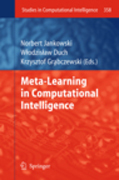
Meta-learning in computational intelligence
Jankowski, Norbert
Duch, Wlodzislaw
Grabczewski, Krzysztof
Computational Intelligence (CI) community has developed hundreds of algorithms for intelligent data analysis, but still many hard problems in computer vision, signal processing or text and multimedia understanding, problems that require deep learning techniques, are open. Modern data mining packages contain numerous modules for data acquisition, pre-processing, feature selection and construction, instance selection, classification, association and approximation methods, optimization techniques, pattern discovery, clusterization, visualization and post-processing. A large data mining package allows for billions of ways in which these modules can be combined. No human expert can claim to explore and understand all possibilities in the knowledge discovery process. This iswhere algorithms that learn how to learnl come to rescue. Operating in the space of all available data transformations and optimization techniques these algorithms use meta-knowledge about learning processes automatically extracted from experience of solving diverse problems. Inferences about transformations useful in different contexts help to construct learning algorithms that can uncover various aspects of knowledge hidden in the data. Meta-learning shifts thefocus of the whole CI field from individual learning algorithms to the higherlevel of learning how to learn. This book defines and reveals new theoreticaland practical trends in meta-learning, inspiring the readers to further research in this exciting field. Recent research in Meta-learning in computational intelligence. Presents new Developments and Trends in Computational Intelligence and Learning. Writtenby leading experts in the field INDICE: Universal meta-learning. architecture and algorithms. Meta-learning of instance. selection for data. summarization. Choosing the metric: a simple. model approach. Meta-learning Architectures:. Collecting, Organizing and. Exploiting Meta-knowledge. Computational intelligence for. meta-learning: a promising. avenue of research. Self-organization of supervised. models. SelectingMachine Learning. Algorithms Using the Ranking. Meta-Learning Approach. A Meta-Model Perspective and. Attribute Grammar Approach to. Facilitating the Development of. Novel Neural Network Models. Ontology-Based Meta-Mining. of Knowledge Discovery. Workflows. Optimal Support Features for. Meta-learning..
- ISBN: 978-3-642-20979-6
- Editorial: Springer Berlin Heidelberg
- Encuadernacion: Cartoné
- Páginas: 362
- Fecha Publicación: 03/06/2011
- Nº Volúmenes: 1
- Idioma: Inglés
